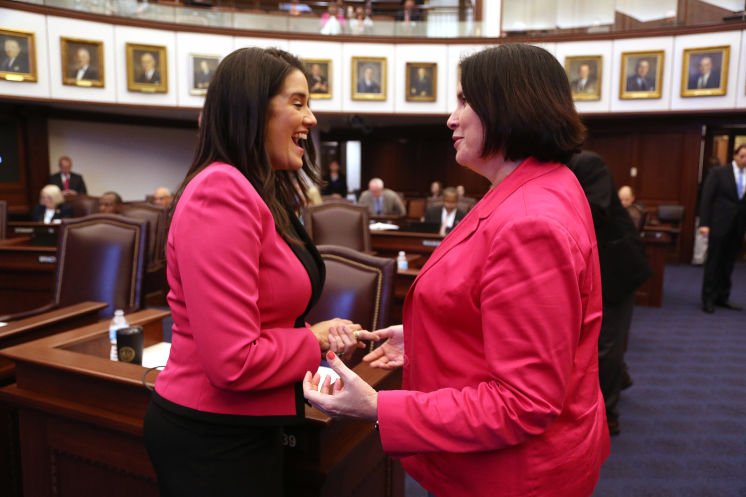

TALLAHASSEE — At the insistence of House Speaker Richard Corcoran, numerous major changes to education policy for Florida’s K-12 public schools — from teacher bonuses and daily recess, to testing reforms and expansions for charter schools — were crammed into a single mammoth bill Friday, with $414 million in spending attached.
All of the policies in the 277-page bill will pass or fail as one. Lawmakers cannot make any changes and they have less than two days to make sense of it before they must cast an up-or-down vote Monday afternoon — when they also vote on the annual budget.
The sheer size and scope of the new version of HB 7069 caught many lawmakers by surprise — even those closely involved in negotiating the compromise between both parties and both chambers.
Several senators, in particular, were troubled by the process and said the bill wouldn’t automatically have their support.
“I’ve yet to read it to see what the final terms of it are,” said Altamonte Springs Republican Sen. David Simmons, who as pre-K-12 education budget chairman helped craft the compromise bill. “It’s something that, I think, lends itself to problems, and it restricts the ability of the senators to be able to change things that they would like to change, to fine-tune the policy.”
“It’s less than optimal, for sure,” said Sen. Tom Lee, R-Thonotosassa.
Despite repeated promises that the public and the Legislature would have time to debate the bill, the rewrite was done in private and the final language was released online just minutes before a public meeting noticed one hour in advance. Corcoran, R-Land O’Lakes, and Senate President Joe Negron, R-Stuart, discussed the bill for 10 minutes before formally accepting the compromise they’d struck in secret.
Many of the policies now in the bill — such as school recess or efforts to improve students’ civics education — have no impact on the budget.
“It’s probably a more extensive deal than I’ve ever seen before, and I’m very hopeful we don’t do that again next year,” Senate Appropriations chairman Jack Latvala, R-Clearwater, told the Times/Herald.
The bill’s two main features are $140 million to help perpetually failing schools improve and $233 million toward teacher bonuses. The bonuses are not only through the “Best & Brightest” program, which lawmakers will keep as-is until eligibility criteria would change in 2021.
For 2018, 2019 and 2020, all “highly effective” teachers would get a $1,200 bonus and all “effective” teachers would get an $800 bonus.
“So every teacher that is not being fired is receiving a bonus for the next three years,” said Hialeah Republican Rep. Manny Diaz Jr., the House Pre-K-12 education chairman.
Latvala and other senators said Corcoran demanded that the K-12 policies all be lumped into a single budget policy bill as a condition to even begin the formal budget conference negotiations last week. Corcoran’s spokesman did not return a request for comment.
But many lawmakers were in the dark that that was what was going to happen.
Broward County Rep. Shevrin Jones, the top Democrat on the House Education Committee, said he learned Friday that there would be a single education budget bill that had ballooned to 277 pages.
“It’s a lot. You can’t get everything you want and you’re not going to agree on everything,” said Jones of West Park.
A Friday surprise, too, was the inclusion of myriad policies the Senate passed off the floor just Thursday. Miami Republican Sen. Anitere Flores, who had spearheaded that legislation, said she was surprised to learn through “rumors” that her work would be folded into the budget bill.
Neither she nor many other lawmakers had even glimpsed the final bill by Friday evening. But Flores said one aspect in particular was disappointing: While school recess is included in the bill, it comes with a carve-out for charter schools.
Only traditional public schools would have to provide 20 minutes of recess each day, not the 650 charter schools that serve more than 250,000 students.
“That is a surprise,” Flores said, saying the intention of parents who advocated for the recess policy was very clear — that it should apply to all public school students.
“So many times in this building we say how charter school students are public school students and we shouldn’t treat them differently for other reasons. I think to treat them differently for this is disappointing,” Flores said.
Contact Kristen M. Clark at [email protected]. Follow @ByKristenMClark.




